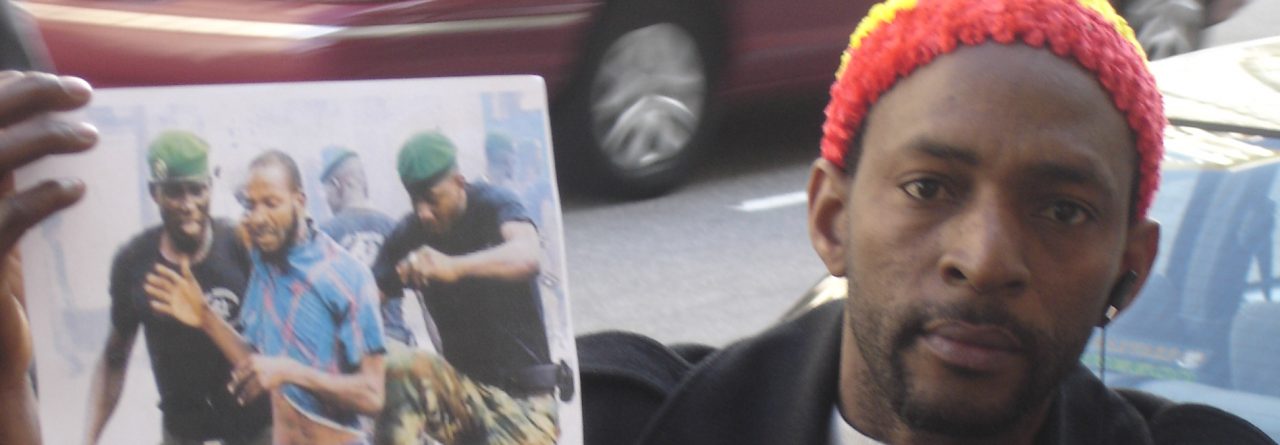Article publié par le 27 avril 2013 à 9h2
De tous les pays Noirs Africains, les Guinéens sont les plus prompts à implorer la «communauté» dite internationale à la moindre petite difficulté politique normale intérieure. Ici on invoque BAN KI MOON. Là, on sollicite le représentant de l‘Union Européenne qui se prend pour le Gouverneur Général de la Guinée, parce que son organisation financerait ceci ou cela. Ailleurs, on se soumet obséquieusement aux injonctions injustifiées de l’Ambassadeur des U.S.A. dont on cherche en vain le caractère diplomatique de ses agissements militants pour M. Alpha CONDE. En quelque sorte, la préférence pour un homme pourvoyeur de concessions minières, et le rejet de populations pacifiques délestées de leur propre pays. Singulière diplomatie.
Jamais par le passé, notre PATRIE n’a été si humiliée, si traînée dans la boue, depuis la cooptation de M. Alpha CONDE à sa tête, par des réseaux extérieurs dont les Guinéens de base comprennent désormais qu’ils défendent des intérêts absolument contraires aux leurs.
La diplomatie de menace et d’intimidation des populations guinéennes par l’ambassadeur des U.S.A. à CONAKRY est une source possible de radicalisation de la jeunesse du pays.
Ce nouvel ambassadeur à CONAKRY, d’ailleurs très lié aux affairistes miniers Anglo-américains et Sud-Africains, ne cesse d’intriguer de simples citoyens guinéens. Car ses ingérences grossières dans les petits différends politiques intérieurs, sont très loin de la démarche diplomatique normale, mais très proches des intimidations de type bar bouzard.
Le militantisme RPGISTE outrancier du diplomate des U.S.A. à CONAKRY, ses agissements agressifs déraisonnables contre les adversaires politiques de M. Alpha CONDE, n’annoncent rien de bon pour mes compatriotes, ni maintenant, ni dans le futur proche et lointain.
Il va dans les camps militaires à KINDIA et ailleurs, comme si la Guinée était un simple Comté de l’Alabama, ou de l’Oregon. Il donne des leçons de «démocratie» aux Guinéens qui ne lui demandent rien. Je me suis laissé dire qu’il aurait ordonné à M. Alpha CONDE de fixer la date du 30 Juin pour les législatives. Or, il n’ignore pas que le KIT électoral WAYMARK-SABARI Technologie a déjà créé préventivement un stock de 750. 000 faux électeurs en Haute-Guinée, notamment à KANKAN, SIGUIRI, KOUROUSSA, KEROUANE (les bastions supposés de M. Alpha CONDE), et limité sévèrement les inscriptions au fichier électoral dans les régions réputées favorables à l’opposition (la Moyenne-Guinée, la Basse-Guinée et maintenant une bonne partie de la Guinée Forestière). Peut-être a t-il lui-même, ou ses amis Sud-Africains (Services Secrets de M. Jacob ZUMA qui peuplent le palais Sékoutouréya) contribué à créer ces faux électeurs ? Continue reading “La « communauté internationale » en Guinée-CONAKRY : des ambiguïtés à expliquer à ceux et à celles qui veulent comprendre.”


 General at the U.S. Consulate in Erbil, Iraq, a position he has held since June 2010. Previously, he was the Team Leader for the Provincial Reconstruction Team in Mosul, Iraq from 2008 to 2009. Prior to serving in Iraq, he was the Deputy Chief of Mission at the U.S. Embassy in Kosovo (2006-2009) and Burundi (2003-2005). Previously, Mr. Laskaris was a member of the U.S. Secretary of State’s Policy Planning Staff (2001-2003) and Advisor to the U.S. Mission to the United Nations (1999-2001). Other overseas assignments have included Political Officer in Luanda, Angola; Political and Economic Officer in Gaborone, Botswana; and Vice Consul in Monrovia, Liberia. From 1996 to 1997, he served as Desk Officer for Rwanda and Burundi at the Department of State.
General at the U.S. Consulate in Erbil, Iraq, a position he has held since June 2010. Previously, he was the Team Leader for the Provincial Reconstruction Team in Mosul, Iraq from 2008 to 2009. Prior to serving in Iraq, he was the Deputy Chief of Mission at the U.S. Embassy in Kosovo (2006-2009) and Burundi (2003-2005). Previously, Mr. Laskaris was a member of the U.S. Secretary of State’s Policy Planning Staff (2001-2003) and Advisor to the U.S. Mission to the United Nations (1999-2001). Other overseas assignments have included Political Officer in Luanda, Angola; Political and Economic Officer in Gaborone, Botswana; and Vice Consul in Monrovia, Liberia. From 1996 to 1997, he served as Desk Officer for Rwanda and Burundi at the Department of State. 
